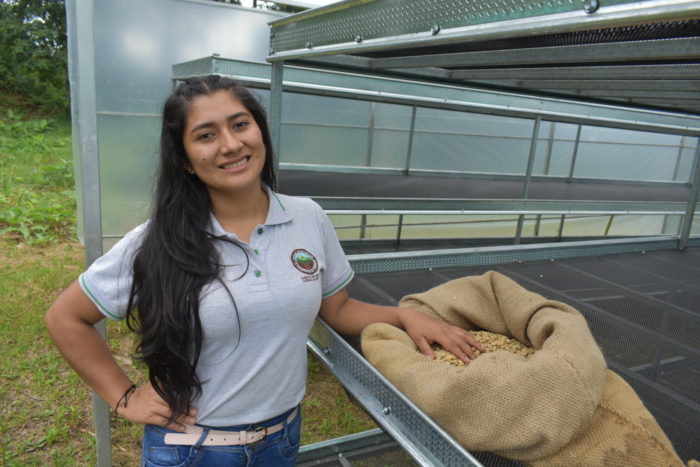
In 2020, Peru was one of the countries most affected by COVID-19, not only in loss of life, but also in its extensive damage to the economy in both rural and urban areas. This year, while tough, served as a test of unity, solidarity and responsiveness in Peru. It’s a year where the cooperative model proved to be useful in responding to members needs in the most challenging times.
NCBA CLUSA’s Creating an Environment for Cooperative Expansion (CECE) project, funded by USAID’s Cooperative Development Program (CDP) sought, from very early on, to help cooperatives adapt to these new circumstances. CECE works to facilitate a more enabling legal and regulatory environment for cooperatives by developing the capacity of local cooperative support organizations such as public entities and cooperative apex organizations. CECE also works directly with 15 coffee and cocoa cooperatives across six regions in Peru to help improve their business and overall performance. Building on CECE partner’s accomplishments before the pandemic, it was possible to quickly adapt workplans to respond to new needs created by the pandemic and help cooperatives restart operations as soon as adaptative measures were taken.
After conducting an assessment to identify barriers to cooperative development in the current General Law of Cooperatives (using CLARITY), receiving feedback from and agreeing to next steps with main cooperative stakeholders, NCBA CLUSA was invited to facilitate a multi-sectorial group lead by Peruvian Ministry of Production (PRODUCE) to modernize the Peruvian cooperative law. Eight meetings were held with apex organizations, ministries, and individual cooperatives and, with the support of international cooperative law experts, CECE worked to clarify contentious points in the legislation and options for its modification.
The consensus reached was presented in five regions (three in person and two virtual) to receive additional feedback. All these inputs were consolidated into a proposal for a modernized General Law of Cooperatives, something that has been attempted for more than five years. in June 2020, with the Netherlands-based Agriterra and PRODUCE, CECE also supported the passing of an Emergency Supreme Decree to expand the powers vested in cooperatives’ directors so that all 1,245 Peruvian cooperatives throughout the country could sign contracts, receive credits and donations, and could continue to operate during the sanitary restrictions brought by the pandemic. This Decree also allows cooperatives to hold virtual general assemblies, and CECE is working with PRODUCE to find an effective digital platform for this.
As part of CECE’s partnership with local cooperative support organizations, CECE co-organized two three-month courses for 70 central and regional Ministry of Agriculture officials on planning, results-based management, and impact indicators. As a result, the Ministry created a planning tool that they will pilot in 2021. In addition, CECE trained 25 regional officials from PRODUCE on cooperative, associativity with a focus on legal aspects and marketing, which we hope to expand in 2021.
In partnership with the National Confederation of Cooperatives, CECE co-hosted four virtual learning events on cooperative integration, women’s leadership in cooperatives, the psychological effects of COVID-19, and the Cooperatives General Law. In total, 350 of their members participated. A systematization of main learnings from these exchanges will be published in 2021. CECE has also come to an agreement with the National Coffee Board (JNC), which has participated in many of the mentioned activities to improve the legal and regulatory framework for cooperatives in Peru.
As part of CECE’s direct work with 15 cooperatives, 150 coaching sessions were held on finance, governance, marketing, accounting, tax law, and psychology. These have resulted in six digital catalogs, six brands (including three centered on “youth education,” “cooperative elders,” and “fight against deforestation” themes), one promotional video, one strategic plan, four financial plans, and four bylaws reformulations. Nine partner cooperatives were trained in cooperative marketing and membership communication, and as a result, seven Facebook pages and six WhatsApp groups were established as a tools to improve communication among members. CECE also supported five cooperatives in applying and receiving USD 1.55 million in credit from the Reactiva Peru public program.
CECE co-hosted 29 webinars on cooperative development, such as Aprendo en 20 (with PRODUCE) on public Covid-19 recovery programs available to cooperatives and Co-op Marketing, in which 490 women and 364 men participated during the live events, and the recordings garnered over 4,000 Facebook views. Many of the women who participated in Co-op Marketing webinars are women cooperative members who have later received capacity building on digital marketing and already putting them to use for the benefit of their cooperatives.
At the start of 2021 (January and February), the CDP implemented a Digital Marketing School with 75 participants from Peru and El Salvador. CECE is waiting for mobility restrictions to be lifted to complete a market study to better understand the demand for ground roasted coffee in Cusco and to conduct an analysis to survey the impact of COVID-19 on cooperative finances, in addition to their other activities. In 2021, CECE plans to focus on women inclusion, leadership and economic empowerment through cooperatives, implementing recommendations from its Gender Analysis. Also, in partnership with Canadian Direct Global, CECE is planning to advance inter-cooperation among cooperatives, bridging the rural and urban divide.
These achievements in 2020 and activities planned for 2021 have been possible thanks to our partnerships with PRODUCE, Ministry of Agriculture, CONFENACOOP, JNC, Agriterra, and other CDP implementers, such as Genex and Equal Exchange, and our 15 partner cooperatives in particular.


